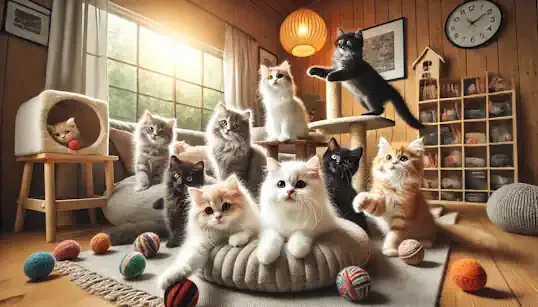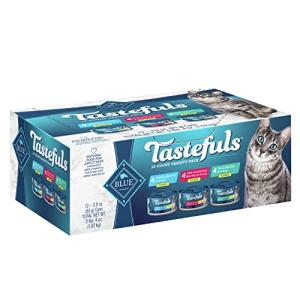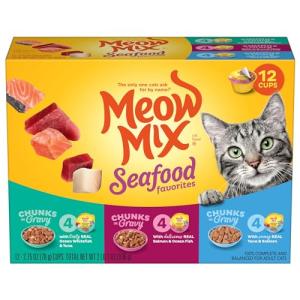Tiny paws padding softly across the floor, boundless bursts of playful energy that suddenly erupt into purring cuddles, and those high-pitched meows that seem to melt even the most hardened hearts – kittens bring an unparalleled joy into our lives. Welcoming a kitten into your home is the start of an exciting adventure, a journey filled with heartwarming moments and delightful antics. But beyond the immediate cuddles and playtime, lies the rewarding responsibility of raising these tiny furballs to be happy, healthy, and well-adjusted companions.
Raising a kitten is more than just providing food and shelter; it’s about nurturing a life, shaping a personality, and setting the foundation for years of joyful companionship. The first few months of a kitten's life are a critical window of opportunity, a formative period that profoundly influences their physical and behavioral development. During this precious time, kittens learn essential social skills, develop their personalities, and establish health patterns that will impact them for years to come. Raising them "right" – with knowledge, dedication, and a deep focus on their well-being – isn't just beneficial for the kitten; it's an investment in a stronger, more fulfilling bond between you and your feline friend for the entirety of their lives together. This comprehensive guide is your roadmap to navigating the wonderful, and sometimes challenging, journey of raising happy, healthy, and well-socialized kittens. We’ll walk you through every essential stage, from the delicate care of newborns, through the crucial socialization period, to establishing healthy routines for nutrition, environment, play, and health, and ultimately, preparing them to thrive in their forever homes, bringing immeasurable joy to your life and theirs.
The journey of kittenhood begins in those delicate first weeks, a time of intense nurturing and rapid development. Whether you are caring for a litter with their mother cat present, or taking on the incredibly demanding but rewarding task of raising orphaned kittens, understanding the specific needs of newborns (0-4 weeks old) is paramount.
In the ideal scenario, the mother cat, or queen, is present and actively caring for her kittens. Nature has equipped mother cats with an innate ability to provide the most essential care for their newborns. The mother cat provides crucial warmth, keeping the kittens at the right body temperature in their vulnerable early days. She provides perfect nutrition through her milk, packed with antibodies and essential nutrients perfectly formulated for kitten growth. She diligently grooms them, stimulating them to eliminate and keeping them clean. And perhaps most importantly, she initiates early socialization, teaching them essential feline social cues and behaviors. In this blessed scenario, your role is primarily to support the mother cat and ensure a safe and conducive environment. Provide the queen and her kittens with a quiet, safe nesting area. This space should be calm, draft-free, and private, allowing the mother cat to feel secure and undisturbed. A cardboard box lined with soft blankets, placed in a quiet corner of a room, often works well. Ensure the area is "kitten-proofed," meaning safe from drafts, hazards, and easy for the mother cat to enter and exit while containing the kittens. Your role then becomes one of careful monitoring. Observe the mother cat's health and behavior. Ensure she is eating and drinking well and seems comfortable and attentive to her kittens. Crucially, monitor the kittens themselves. Are they nursing well? Do they appear content and settled after feeding? Are they gaining weight appropriately? Weight gain is a key indicator of health in newborn kittens. While mother's milk is generally sufficient, there might be situations where supplemental feeding becomes necessary. This could be if the mother cat isn't producing enough milk, if the litter is very large, or if a kitten seems weak or isn't gaining weight adequately. If you have any concerns about milk supply or kitten health, always consult your veterinarian immediately. They can guide you on whether supplemental feeding with kitten milk replacer (KMR) is needed and advise on appropriate techniques. If supplementation is required, you'll need to learn bottle feeding techniques. Use a kitten-specific milk replacer, carefully prepared according to package instructions. Feeding frequency is very high in the early weeks, gradually decreasing as they grow. Use the correct nipple size for kittens and learn the proper feeding position (kitten on their belly, not on their back like a human baby). Burping kittens after each feeding is also important, just like with human infants. Hygiene is also key in the nesting area. Gently clean the nesting area regularly, changing bedding frequently to maintain a clean and sanitary environment for the mother and kittens.
If, however, you are faced with raising orphaned kittens, or kittens separated from their mother, the responsibility becomes significantly more hands-on and demanding. In these cases, you become the kittens' surrogate mother, and must immediately address their most critical needs: warmth, food, and elimination. Providing warmth is absolutely vital for orphaned newborn kittens. They cannot regulate their own body temperature effectively at this age and are highly susceptible to chilling. Use heating pads placed under blankets in their nesting area, ensuring kittens cannot directly contact the heating pad to prevent burns. Warmed rice socks (rice heated in a microwave, wrapped in a sock) can also provide safe and gentle warmth. In some cases, for extremely young or weak kittens, an incubator might be necessary to maintain a consistently warm and humid environment, especially if advised by a veterinarian. Bottle feeding becomes your primary task. Kitten milk replacer (KMR) is essential – cow's milk or other milk alternatives are not suitable and can be harmful. Follow KMR package instructions carefully for proper preparation. Feeding frequency is very high in the first weeks – often every 2-3 hours around the clock for very young kittens, gradually spacing out feedings as they grow. Use kitten-specific bottles and nipples and ensure the nipple size is appropriate for the kitten's age (milk should flow slowly, not gush). Feed kittens in a prone position, on their belly, mimicking natural nursing. Burp them gently after each feeding to prevent gas and discomfort. Just as mother cats stimulate their kittens to eliminate, you will need to take on this role for orphaned kittens. After each feeding, gently stimulate the kitten's perineal area (the area between the genitals and anus) with a warm, damp cloth or cotton ball. This mimics the mother cat's licking and encourages urination and defecation. Observe their urine and stool output to ensure they are eliminating properly. Hygiene is even more critical with orphaned kittens, as they are more vulnerable to infections without maternal antibodies from colostrum. Keep kittens and their environment scrupulously clean and dry. Change bedding frequently, wash bottles and nipples thoroughly after each feeding, and practice good hand hygiene to prevent introducing pathogens.
Even in these very early weeks, gentle and positive human interaction is important, even if you are primarily focused on their basic needs. Once kittens are stable, feeding well, and maintaining their body temperature, start introducing short, gentle handling sessions. Acclimatize them to human touch and scent. Keep interactions brief and positive, focusing on gentle petting and soft vocalizations. Avoid overwhelming them with long handling sessions or loud noises. Throughout these first few weeks, meticulous monitoring of weight and developmental milestones is crucial. Weigh kittens daily, especially in the first few weeks, to track their weight gain and ensure they are thriving. Keep a log of their weight. Familiarize yourself with expected weight gain benchmarks for kittens of different ages and breeds. Observe their developmental milestones – eyes opening (typically around 1-2 weeks of age), ears unfolding, starting to crawl and become more mobile, and so on. Monitor for any developmental delays or abnormalities and consult your veterinarian if you have any concerns. Schedule their first veterinary check-up around 2-4 weeks of age. This initial visit allows your veterinarian to assess their overall health, check for any congenital issues, and initiate deworming, which is almost always necessary in young kittens as they are often born with intestinal parasites.
As kittens transition out of the newborn phase, they enter the crucial socialization window, roughly between 3 to 14 weeks of age. This period is widely recognized by veterinary behaviorists as the most critical time for shaping a kitten's social behavior and future temperament. During this period, a kitten's brain is incredibly plastic and receptive to new experiences. Positive exposures during this window will profoundly shape their social skills, their comfort level around humans and other animals, and their overall adaptability to different environments. Think of this time as laying the foundation for a friendly, well-adjusted feline companion. Human socialization during this period is paramount. Aim to expose your kittens to a wide variety of people. This includes men, women, and children (if children are present, ensure they are gentle, supervised, and understand how to interact respectfully with kittens), and people of different ages and appearances. Frequent, gentle, and positive handling is key. Handle kittens regularly, gently petting, cuddling, and holding them in different positions. Get them accustomed to being touched all over – paws, ears, mouth – to prepare them for future veterinary exams and grooming. Crucially, always associate human interaction with positive experiences. Pair human handling with pleasant things – offer food during handling, engage in gentle play during interactions, speak softly and reassuringly, ensure they are warm and comfortable during handling sessions. Absolutely avoid any forceful or negative experiences during socialization, as these can be deeply detrimental and create fear-based behaviors that can be difficult to overcome.
Socialization with other cats, if applicable and safe, is also important during this window. If the mother cat and littermates are present, observe their natural socialization within the feline family. Kittens learn feline social cues and appropriate play from their mother and siblings. Ensure these interactions are generally positive and playful, and intervene if you observe any signs of bullying or excessive aggression. If you are introducing kittens to other adult cats in your household, do so carefully and gradually. Slow and controlled introductions are crucial to create positive associations and prevent fear or aggression. Begin with scent swapping – exchanging bedding or toys between the kittens and resident cats. Progress to gradual visual access, perhaps through a baby gate or screen door, allowing them to see each other without direct contact. Finally, move to brief, supervised interactions in a neutral territory, carefully monitoring their body language and ensuring the interactions remain positive and non-threatening. Broaden their horizons by exposing them to novel sights, sounds, and environments. Gradually acclimate them to common household sounds, such as the vacuum cleaner, television, doorbell, phone ringing, and kitchen noises. Start at low volumes and gradually increase, always pairing these sounds with positive reinforcement, like treats or gentle praise. Introduce them to different textures and surfaces – carpet, tile, wood floors, blankets, scratching posts of various materials. Allow supervised exploration of your home, gradually expanding their territory room by room as they become more confident and comfortable. If possible and appropriate, acclimate them to car travel. Start with very short, positive car trips – simply placing them in a carrier in the car, offering treats and praise, and then returning inside. Gradually increase the duration and distance of car rides to desensitize them to car travel, which will be beneficial for future vet visits and other journeys. Finally, remember that play itself is a vital form of socialization. Engage in interactive play with kittens, using wand toys and other interactive toys to mimic prey and encourage natural hunting behaviors. Play sessions with humans and, if applicable, with littermates or other friendly cats, help them develop social skills, learn appropriate play boundaries, and strengthen bonds. During play socialization, it's also important to teach kittens appropriate play boundaries. Redirect any biting or scratching of hands onto toys. Consistently use toys to keep a safe distance between your hands and their claws and teeth during play. If a kitten bites or scratches your hands during play, immediately stop the play session, say "Ouch!" firmly but gently, and redirect their attention to a toy or end the play session briefly. This teaches them that biting and scratching hands during play is not acceptable.
Nutrition during this rapid growth phase is paramount. Kitten-specific food is not just a marketing gimmick; it's an essential element of raising healthy kittens. Kittens have significantly different nutritional needs compared to adult cats. Kitten food is specially formulated to provide higher levels of calories, protein, fat, and crucial nutrients like calcium and phosphorus, all of which are essential to support their rapid growth and development during this critical period. Choosing a kitten food is the first step, and then you'll need to consider the type: dry food (kibble), wet food (canned or pouches), or a combination of both. Dry food is convenient, often more economical, and can be left out for grazing if appropriate for your kitten’s feeding style and your veterinarian’s advice. It can also contribute to dental health to some extent, through the chewing action. Wet food has a higher moisture content, which is incredibly important for kitten hydration, and is often more palatable, especially for very young kittens or picky eaters. Wet food can also be easier for very young kittens to eat due to its softer texture. Many owners choose combination feeding, offering both dry and wet food to leverage the benefits of both types. Finding the right balance of dry and wet food can provide hydration, palatability, and convenience. Feeding frequency and appropriate portion sizes will change as your kitten grows. Very young kittens, from weaning up to about 3-4 months of age, need frequent meals to fuel their rapid growth. Offer smaller, more frequent meals throughout the day – often 3-4 meals, or even more for very young kittens. As they grow, from about 4-6 months onwards, gradually reduce feeding frequency and increase portion sizes, transitioning towards a more adult feeding schedule of typically two meals a day. Always follow the feeding guidelines provided on your chosen kitten food packaging as a starting point. These guidelines offer general recommendations based on weight and age. However, always adjust feeding amounts based on your individual kitten's body condition and activity level. You should be able to feel their ribs easily but not see them prominently. Introducing variety into their diet, cautiously and gradually, can help prevent picky eating habits later in life. Once they are consistently eating a nutritionally balanced kitten food, you can gradually introduce different textures and flavors of kitten-appropriate foods. Offer small amounts of new foods and monitor for any digestive upset before fully incorporating them. Treats can be used effectively for positive reinforcement during training and socialization, but they should always be offered in moderation and constitute only a small portion of their overall diet. Choose treats specifically formulated for kittens or small, healthy treats appropriate for cats. And as always, ensure fresh, clean water is available to your kitten at all times, reiterating the importance of hydration from the early weeks onwards.
Creating a kitten-friendly environment is about transforming your house into a haven designed for their safety, exploration, and happiness. Kitten-proofing your home is non-negotiable. Kittens are naturally curious and exploratory, and their inquisitive nature can lead them into potentially dangerous situations. Conduct a thorough kitten-proofing assessment of your home, focusing on safety first. Secure electrical cords by tucking them away, covering them with cord protectors, or using cord management systems to prevent chewing and electrocution. Put away all toxic substances, including cleaning supplies, medications (both human and pet), chemicals, and antifreeze, storing them securely out of reach, preferably in locked cabinets. Pick up and secure small objects that kittens might ingest, such as buttons, string, rubber bands, small toys, and anything else small enough to be swallowed and cause intestinal blockages. Ensure window and balcony safety by installing secure screens or netting on windows and balconies to prevent falls, especially if you live in an apartment or multi-story home. Keep toilet lids closed at all times to prevent kittens from accidentally falling into toilet bowls, which can be particularly dangerous for small kittens. Reiterate the danger of toxic plants, and remove any plants known to be toxic to cats from your home or place them completely out of reach, in rooms your kitten cannot access. Offer safe plant alternatives, such as cat grass, if you want to provide greenery that is safe for chewing. Provide essential resources in multiple locations throughout your home. This is especially crucial in multi-kitten or multi-cat homes, but is good practice even for single-kitten households. Multiple food and water stations prevent competition and ensure all kittens have easy access to resources. Provide multiple litter boxes – the general rule of thumb is one more litter box than the number of cats. Place them in various locations, and consider offering different types of litter boxes (covered and uncovered) and litters if you have multiple kittens to cater to individual preferences. Multiple scratching posts and surfaces, in various locations and made of different materials, give kittens ample opportunity to express their natural scratching behavior and reduce the likelihood of them scratching furniture. Offer multiple beds and resting spots throughout your home, providing choices of locations (sunny, shady, quiet, social) and types of beds (covered beds, open beds, window perches). Vertical space and climbing opportunities, such as cat trees and sturdy shelves, are not just enrichment; they are essential resources. Ensure your kitten has access to vertical territory to feel safe, secure, and in control of their environment. Finally, provide safe hiding places and retreats. Kittens, like all cats, appreciate having secure spots where they can feel safe and retreat when they need quiet time or feel overwhelmed. Cardboard boxes, cat tunnels, covered beds, and quiet corners all serve as valuable safe havens for kittens. Designate specific play areas that are safe for active kitten play, away from fragile items or areas that you don’t want kittens to access.
Playtime isn't just fun and games for kittens; it’s a crucial component of their overall development. Play is absolutely essential for healthy kitten development, providing numerous benefits that go far beyond simple entertainment. Play provides essential physical exercise, helping kittens develop their coordination, balance, and muscle strength. It's also vital for developing their social skills, particularly when playing with littermates or other cats, teaching them about appropriate play behavior and social boundaries. And perhaps most importantly, play is a vital form of mental stimulation, engaging their natural hunting instincts and preventing boredom and behavioral problems. Interactive play, where you actively engage with your kitten using toys, is the most beneficial type of play. Wand toys and teasers are fantastic for mimicking the movements of prey, encouraging kittens to stalk, chase, bat, and pounce, satisfying their hunting instincts in a safe and engaging way. Rotate wand toys regularly to keep them novel and interesting. Puzzle toys and food toys not only provide physical activity but also engage their problem-solving skills. These toys challenge kittens to work for their food, preventing boredom and slowing down eating, which can be beneficial for digestion and weight management. Chasing toys, such as balls, crinkle balls, and toy mice, encourage kittens to chase, bat, and pounce, engaging their natural predatory behaviors. Incorporate scratching play by encouraging kittens to scratch on appropriate surfaces like scratching posts. Use toys to lure them to scratch on the posts, making scratching a fun and rewarding activity. Short, frequent bursts of play are often ideal for kittens, who typically have high energy levels but also short attention spans. Aim for several play sessions throughout the day, even just for 5-10 minutes each session. Observe your kitten's energy levels and adjust play sessions accordingly – kittens will naturally tire out and signal when they’ve had enough play. During playtime, remember to teach appropriate play boundaries. As mentioned earlier, discourage biting and scratching of hands during play. Always redirect play aggression to toys, using toys as a buffer between your hands and their claws and teeth. Be consistent in stopping play and redirecting to toys if hands become the target of biting or scratching, teaching them appropriate play behavior. And finally, remember that enrichment extends beyond structured playtime. Window watching, providing cat trees and vertical space, scent enrichment with catnip and catmint, allowing safe exploration of their environment, and positive social interaction with humans and other friendly pets all contribute to creating a rich and stimulating life for your kitten, keeping them happy, engaged, and well-adjusted.
Setting kittens up for a healthy life from the start involves prioritizing their health and veterinary care. A first veterinary visit is essential, ideally within the first week of acquiring your kitten, or around weaning age if you are raising very young kittens. This initial visit is for a comprehensive health check. Your veterinarian will perform a complete physical exam, assessing their overall health, listening to their heart and lungs, checking their eyes, ears, teeth, abdomen, and looking for any signs of congenital issues or health concerns. A fecal examination is a routine part of a kitten's first vet visit, as intestinal parasites are very common in kittens. Routine deworming is almost always needed, and the vet will recommend an appropriate deworming protocol. The first in their series of initial vaccinations will also be administered at this visit. The core kitten vaccine, FVRCP (Feline Viral Rhinotracheitis, Calicivirus, Panleukopenia), protects against common and serious feline viral diseases. Your veterinarian will discuss a vaccination schedule with you, outlining the timing of booster shots. Vaccination boosters are crucial for kittens. Kittens receive initial immunity from their mother's milk, but this maternal immunity wanes over time, leaving them vulnerable. Booster vaccinations are necessary to build their own long-lasting immunity. The typical vaccination schedule involves booster shots every 3-4 weeks until the kitten is around 16 weeks of age. Rabies vaccination timing will also be discussed, depending on local regulations and your kitten’s age. Deworming and parasite prevention are ongoing aspects of kitten healthcare. Routine deworming will likely be recommended multiple times during their kittenhood, as roundworms and hookworms are very common and kittens can be repeatedly exposed. Your veterinarian will advise on an appropriate deworming schedule. Flea and tick prevention should be started as recommended by your veterinarian, using age-appropriate and kitten-safe products. Discuss heartworm risk and preventative options with your veterinarian, especially if you live in a heartworm-endemic area. Heartworm prevention is much easier and safer than treating heartworm infection. Spaying or neutering is a crucial aspect of responsible pet ownership and contributes significantly to a kitten’s long-term health and happiness. Spaying female kittens and neutering male kittens around 4-6 months of age, or as advised by your veterinarian, prevents unwanted litters, reduces the risk of certain cancers and reproductive diseases, and often reduces unwanted behaviors like spraying and roaming. Microchipping is another essential step, often done at the time of spay/neuter surgery. A microchip provides permanent identification, greatly increasing the chances of reuniting you with your kitten if they ever get lost. Learning to recognize signs of illness in kittens is crucial for early detection and intervention. Kittens can become seriously ill very quickly. Be vigilant for signs like lethargy, weakness, loss of appetite or decreased appetite, vomiting, diarrhea, sneezing, coughing, nasal or eye discharge, difficulty breathing or rapid breathing, dehydration (indicated by dry gums and skin tenting), or fever (though this is difficult to reliably assess at home, general malaise often indicates fever). Any change in a kitten's normal behavior should also be a red flag. If your kitten seems "not themselves," is unusually quiet or withdrawn, or is showing any of these symptoms, seek veterinary advice promptly. Finally, always be prepared for emergencies. Know the location and contact information of your local emergency veterinary clinic. Have a pet first-aid kit readily accessible. Be prepared to seek veterinary care immediately if your kitten experiences any sudden illness or injury.
Gentle handling and basic training, started early and consistently, are essential for building a well-mannered and happy cat. Gentle and consistent handling from day one, as appropriate for the kitten's age and developmental stage, reinforces positive human interaction. Always use positive reinforcement techniques. Reward calm and cooperative behavior with praise, gentle petting, and small, healthy treats. Avoid force or punishment in any form, as this creates fear and distrust, and damages your bond with your kitten. Litter box training is often surprisingly instinctive for cats, but your guidance can help ensure success. Provide an easily accessible litter box, placed in a quiet and private location. Place kittens in the litter box frequently, especially after waking up and after eating. Positively reinforce litter box use by offering praise and gentle petting when they use it successfully. Accidents are normal, especially in the early stages of kittenhood. If accidents happen, clean them up thoroughly with an enzymatic cleaner specifically designed for pet messes to remove odors and discourage repeat accidents in the same spot. Never punish a kitten for accidents. If accidents are persistent or become frequent, rule out underlying medical issues with your veterinarian. Scratch post training is crucial to direct their natural scratching behavior to appropriate surfaces. Place scratching posts in prominent locations, such as near sleeping areas, play areas, and doorways, making them easily accessible and part of their daily environment. Make scratching posts appealing by using catnip or catmint spray on them, placing toys near or on the posts to encourage interaction, and offering praise and rewards when you see your kitten using the scratching post appropriately. If you catch your kitten scratching furniture or other inappropriate surfaces, gently redirect them to a scratching post and reward them for scratching there instead. Experiment with different types of scratching posts and materials – vertical posts, horizontal scratchers, cardboard, sisal, carpet – to discover your kitten's individual preferences. While not essential, introducing basic commands can be enriching for both you and your kitten, and can strengthen your bond. Simple commands like "come" and "sit" can be taught using positive reinforcement techniques, such as clicker training if you are interested in exploring this method.
For those raising kittens who will eventually go to new homes, such as breeders, rescuers, and foster homes, preparing kittens for their forever families is a final, crucial step. Ensure kittens are truly ready to leave their mother or littermates before rehoming them. Generally, kittens should remain with their mother and littermates until at least 8-12 weeks of age, allowing them to be fully weaned, eating independently, reliably using the litter box, and adequately socialized. Provide comprehensive health records and veterinary information to the new owners. This should include a complete vaccination history, deworming records, spay/neuter information (if already performed), microchip details, and any known health issues or predispositions. Create a detailed information packet for new owners to help them smoothly transition their kitten into their new home. This packet should include tips on minimizing stress during the transition to a new home, guidance on feeding and care routines, play and enrichment suggestions, information on continued socialization, veterinary care recommendations (continued vaccinations, parasite prevention, annual checkups), and your contact information as a breeder or rescuer for ongoing support and questions. If you are responsible for matching kittens to new homes, strive to match kittens to the right homes. Consider each kitten's individual personality and energy levels when matching them with potential adopters. Screen potential owners thoroughly to ensure they are a good fit for the kitten’s needs and are committed to providing a loving and responsible forever home.
Raising happy kittens is a truly rewarding journey, an experience filled with joy, love, and the profound satisfaction of nurturing a tiny life into a well-adjusted feline companion. Remember that key elements underpin kitten happiness: nurturing them through those delicate early weeks, diligently socializing them during their critical window, providing proper nutrition to fuel their growth, creating an enriching and safe environment, prioritizing playtime and mental stimulation, ensuring their health through proactive veterinary care, and using gentle handling and basic training to build a well-mannered and bonded cat. Raising happy kittens requires effort, time, and commitment, but the rewards are immeasurable. You are not just raising a pet; you are nurturing a lifelong companion, forging an unbreakable bond, and bringing immeasurable joy into both your life and theirs. Embrace every moment of kittenhood – it’s a fleeting and precious time. Start today by reviewing your kitten's environment and daily routine, and identify even small adjustments you can make to enhance their well-being. You will be setting them firmly on the path to a happy, healthy, and fulfilling life as a cherished member of your family for many years to come.







